engine BUICK PARK AVENUE 1993 Owners Manual
[x] Cancel search | Manufacturer: BUICK, Model Year: 1993, Model line: PARK AVENUE, Model: BUICK PARK AVENUE 1993Pages: 340, PDF Size: 18.17 MB
Page 6 of 340
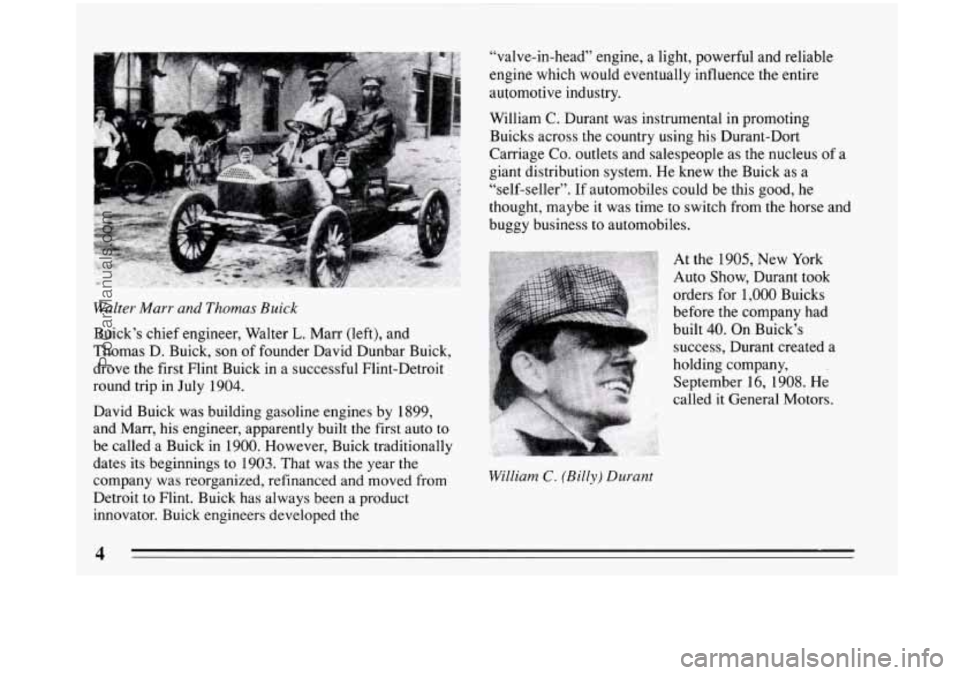
Walter Marr and Thomas Buick
Buick’s chief engineer, Walter L. Man- (left), and
Thomas D. Buick, son of founder David Dunbar Buick,
drove the first Flint Buick in a successful Flint-Detroit
round trip in July 1904.
David Buick was building gasoline engines by
1899,
and Marr, his .engineer, apparently built the first auto to
be called
a Buick in 1900. However, Buick traditionally
dates its beginnings to
1903. That was the year the
company was reorganized, refinanced and moved from
Detroit to Flint. Buick has always been a product
innovator. Buick engineers developed the
4
ProCarManuals.com
Page 7 of 340
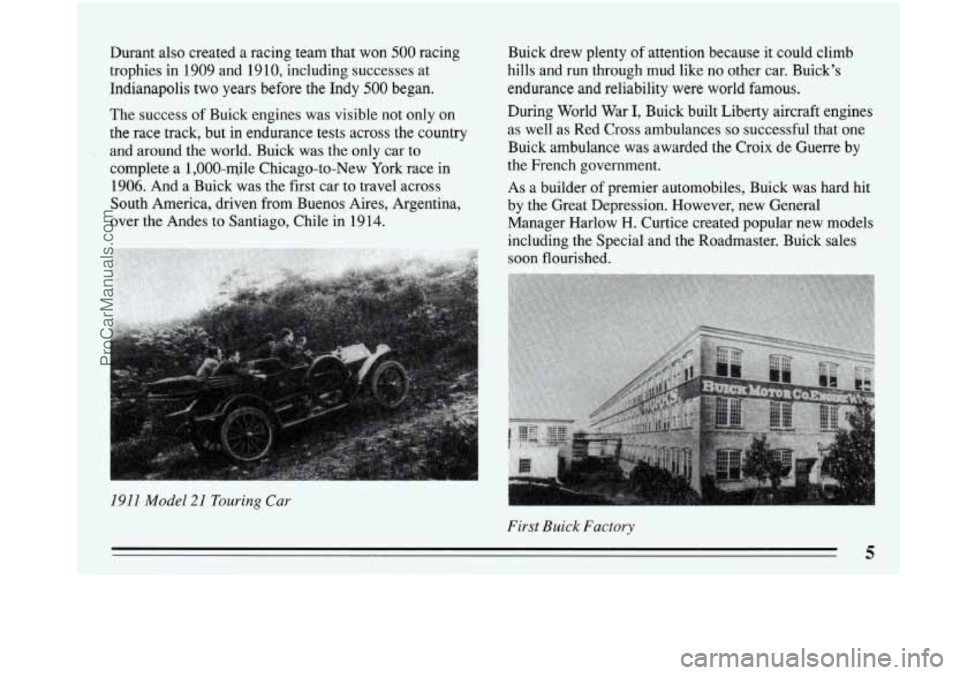
Durant also created a racing team that won 500 racing
trophies in 1909 and 1910, including successes at
Indianapolis two years before the Indy
500 began.
The success of Buick engines was visible not only
on
the race track, but in endurance tests across the country
and around the world. Buick was the only car to
complete a
1,000-mile Chicago-to-New York race in
1906.
And a Buick was the fist car to travel across
South America, driven from Buenos Aires, Argentina,
over the Andes to Santiago, Chile in 19 14.
1911 Model 21 Touring Car
Buick drew plenty of attention because it could climb
hills and
run through mud like no other car. Buick’s
endurance and reliability were world famous.
During World War
I, Buick built Liberty aircraft engines
as well as Red Cross ambulances
so successful that one
Buick ambulance was awarded the Croix de Guerre by
the French government.
As a builder
of premier automobiles, Buick was hard hit
by the Great Depression. However, new General
Manager Harlow H. Curtice created.popular new models
including the Special and the Roadmaster. Buick sales
soon flourished.
First Buick Factory
3
ProCarManuals.com
Page 8 of 340
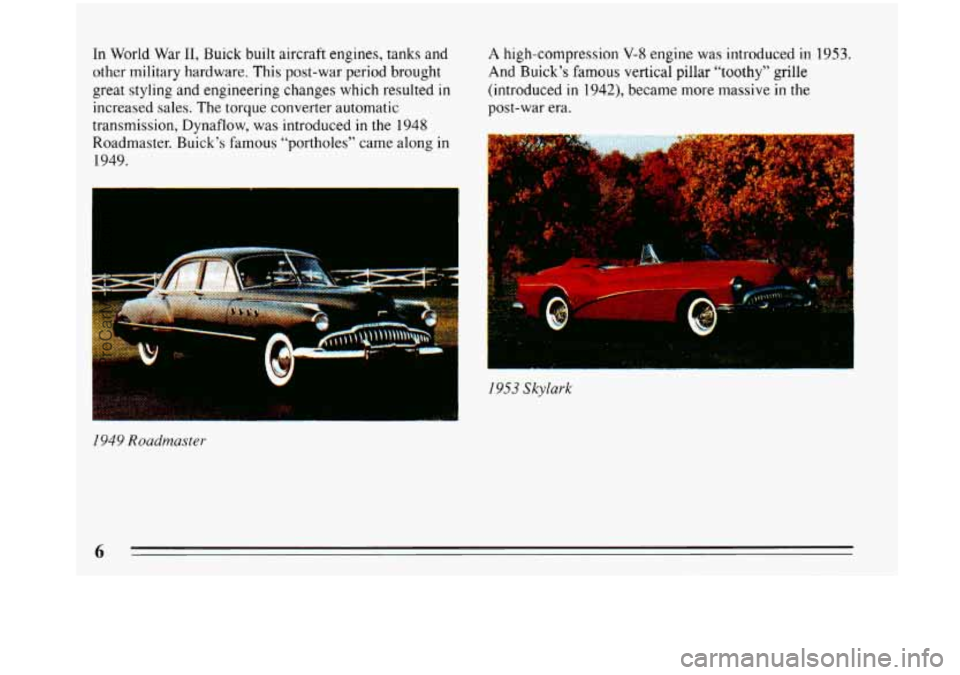
In World War 11, Buick built aircraft engines, tanks and
other military hardware. This post-war period brought
great styling and engineering changes which resulted
in
increased sales. The torque converter automatic
transmission, Dynaflow, was introduced in the
1948
Roadmaster. Buick’s famous “portholes” came along in
1949.
I949 Roadmaster
A high=cornpression V-X engine was introduced in 1953.
And Buick’s famous vertical pillar “toothy” grille
(introduced
in 1942)’ became more massive in the
post-war era.
r -- I
I
1953 Skylark
6
ProCarManuals.com
Page 9 of 340
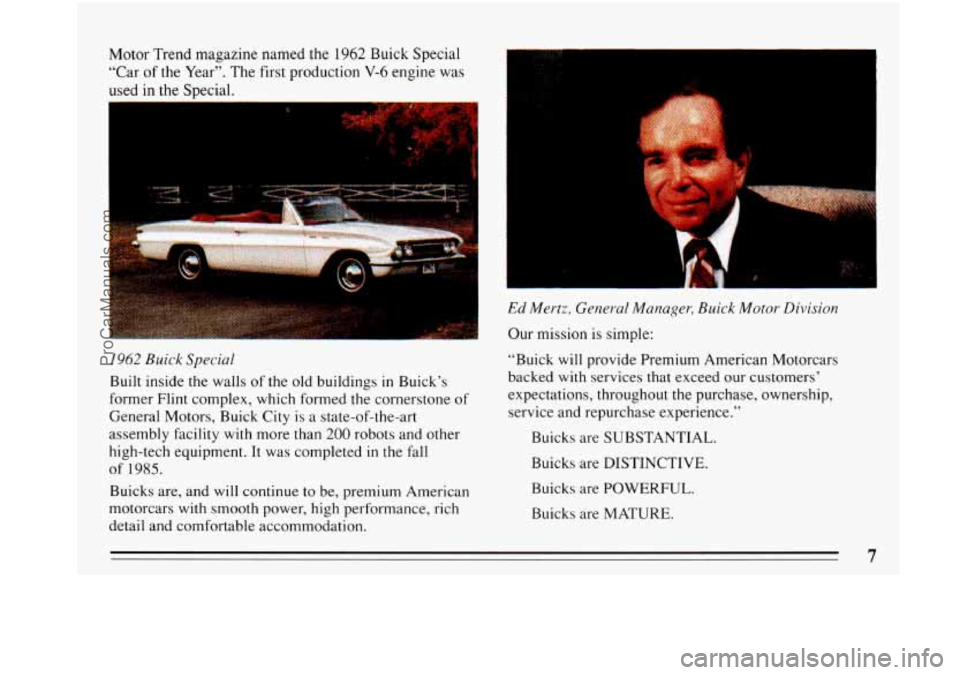
Motor Trend magazine named the 1962 Buick Special
“Car
of the Year”. The first production V-6 engine was
used in the Special.
I962 Buick Special
Built inside the walls of the old buildings in Buick’s
former Flint complex, which formed the cornerstone
of
General Motors, Buick City is a state-of-the-art
assembly facility with more than
200 robots and other
high-tech equipment. It was completed
in the fall
of
1985.
Buicks are, and will continue to be, premium American
motorcars with smooth power, high performance, rich
detail and comfortable accommodation.
Ed Mertz, General Manager, Buick Motor Division
Our mission is simple:
“Buick
will provide Premium American Motorcars
backed
with services that exceed our customers’
expectations, throughout the purchase, ownership,
service and repurchase experience.”
Buicks are SUBSTANTIAL.
Buicks are DISTINCTIVE.
Buicks are POWERFUL.
Buicks are MATURE.
7
ProCarManuals.com
Page 11 of 340
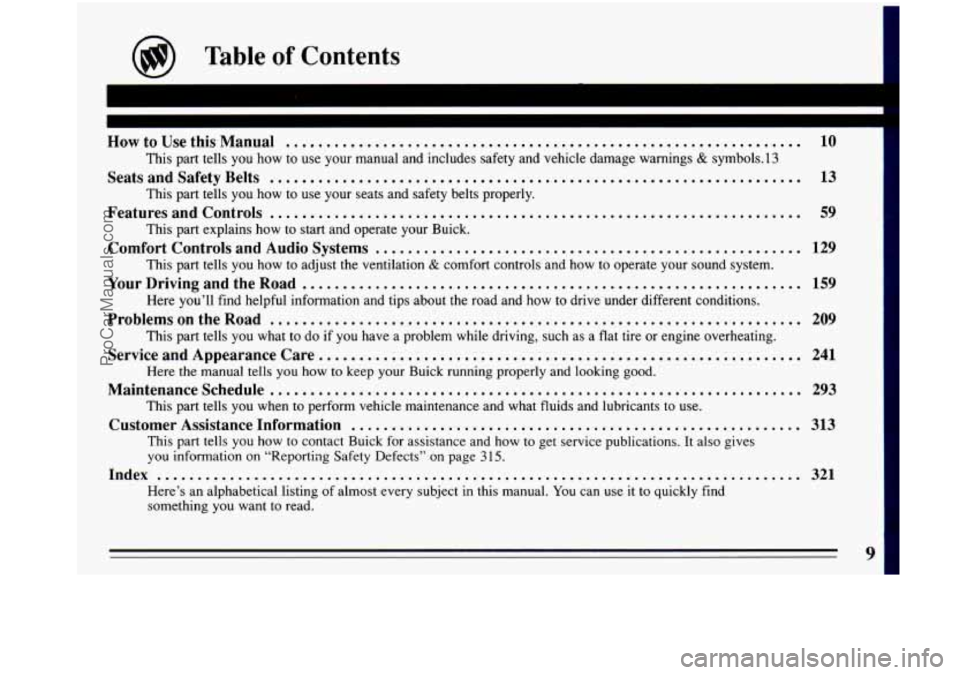
@ Table of Contents
HowtoUsethisManual ................................................................ 10 1
This part tells you how to use your manual and includes safety and vehicle damage warnings & symbols. 13
This part tells you how to use your seats and safety belts properly.
This part explains how to start and operate your Buick.
This part tells you how to adjust the ventilation
& comfort controls and how to operate your sound system.
Here you’ll find helpful information and tips about the road and how to drive under different conditions.
This part tells you what to do if you have a problem
while driving, such as a flat tire or engine overheating.
Here the manual tells you how to keep your Buick running properly and looking good.
This part tells you when to perform vehicle maintenance and what fluids and lubricants to use.
This part tells you how to contact Buick for assistance and how to get service publications. It also gives
you information on “Reporting Safety Defects” on page 315.
Here’s an alphabetical listing of almost every subject in this manual.
You can use it to quickly find
something you want to read.
SeatsandSafetyBelts .................................................................. 13
FeaturesandControls
.................................................................. 59
Comfort Controls and Audio Systems
..................................................... 129
YourDrivingandtheRoad
.............................................................. 159
ProblemsontheRoad
.................................................................. 209
Service and Appearance Care..
.......................................................... 241
Maintenanceschedule
.................................................................. 293
Customer Assistance Information
........................................................ 313
Index
........................................................................\
........ 321
ProCarManuals.com
Page 14 of 340
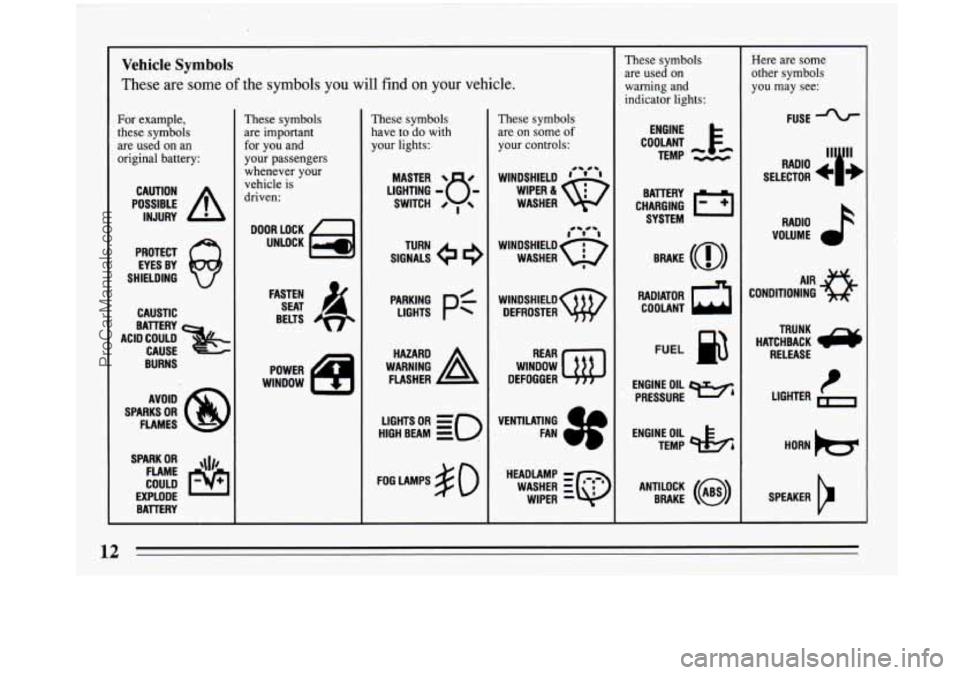
!
!
Vehicle Symbols
These are some of the symbols you will find on your vehicle.
For example,
these symbols
are used on an
original battery:
POSSIBLE A
CAUTION
INJURY
PROTECT
EYES BY
SHIELDING
CAUSTIC
ACID COULD BATTERY
CAUSE
BURNS
SPARK
OR ,\I/,
COULD FLAME
EXPLODE BATTERY
These symbols are important
for you and
your passengers
whenever your
vehicle is
driven:
DOOR LOCK
UNLOCK
FASTEN SEAT
4
BELTS
POWER
WINDOW
These symbols have to do with
your lights:
LIGHTS PC
HIGH BEAM OR = =o
FOG LAMPS $0
These symbols
are on some
of
your controls:
WINDSHIELD ' ' '
WASHER
l0 'r' -1
WINDSHIELD 6$
WASHER 8
WINDSHIELD
DEFROSTER
WINDOW
DEFOGGER
VENTILATING FAN
3f
HEADLAMP -
WIPER -
WASHER iQ
These symbols
are used on
warning and
indicator lights:
COOLANT F-
TEMP --
ENGINE
RADIATOR
a
COOLANT
FUEL
ENGINE OIL wb
PRESSURE
TEMP
OIL &4
ANTILOCK (a)
BRAKE
Here are some
other symbols
you may see:
FUSE
RADIO
>
VOLUME
HATCHBACK
e
TRUNK
RELEASE
LIGHTER
1-1
HORN )tr
SPEAKER
b
ProCarManuals.com
Page 61 of 340
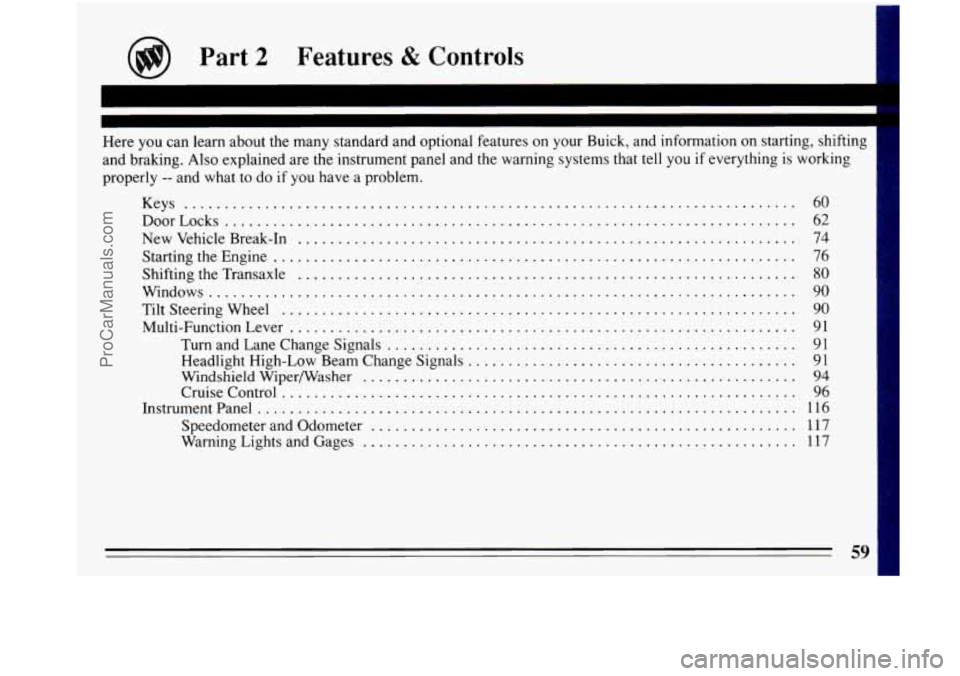
Part 2 Features & Controls
Here you can learn about the many standard and optional features on your Buick. and information on starting. shifting
and braking
. Also explained are the instrument panel and the warning systems that tell you if everything is working
properly
.. and what to do if you have a problem .
Keys ........................................................................\
.... 60
DoorLocks
....................................................................... \
62
NewVehicleBreak-In .............................................................. 74
StartingtheEngine ................................................................. 76
ShiftingtheTransaxle
.............................................................. 80
Windows ........................................................................\
. 90
TiltSteeringWheel
................................................................ 90
Multi-FunctionLever
............................................................... 91
TurnandLaneChangeSignals ................................................... 91
Headlight High-Low Beam Change Signals
......................................... 91
WindshieldWiper/Washer
...................................................... 94
CruiseControl ................................................................ 96
Instrumentpanel
................................................................... 116
Speedometer and Odometer
..................................................... 117
Warning Lights and Gages
...................................................... 117
59
~ .. . ~ .. .. _.__~ ....... - ...... ... ..._- .... -
ProCarManuals.com
Page 72 of 340
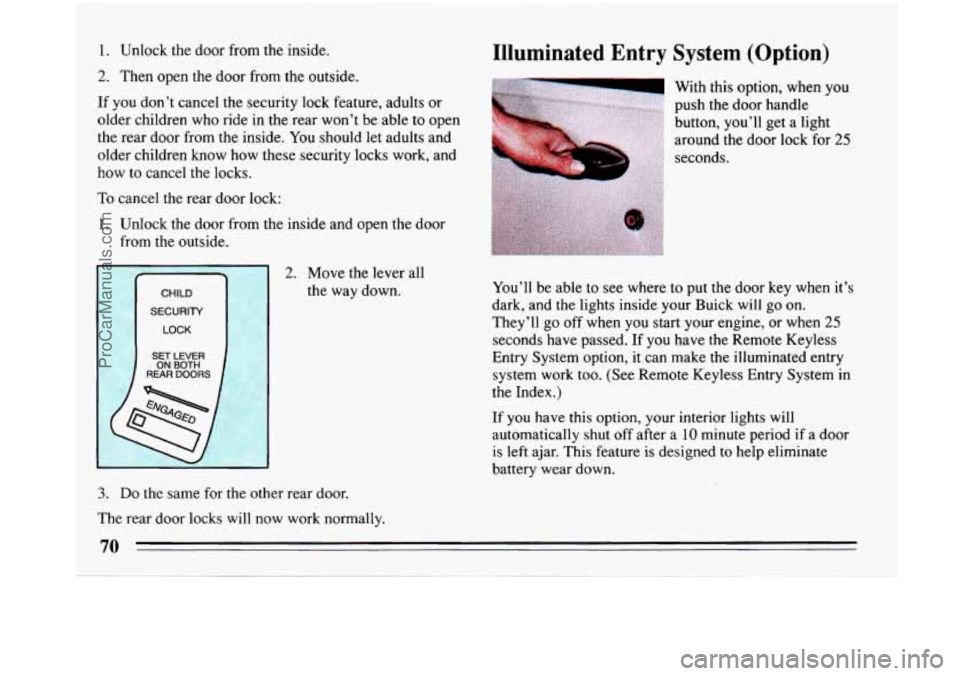
1. Unlock the door from the inside.
2. Then open the door from the outside.
If you don’t cancel the security lock feature, adults or
older children who ride in the rear won’t be able to open
the rear door from the inside.
You should let adults and
older children know how these security locks work, and
how to cancel the locks.
To cancel the rear door lock:
1. Unlock the door from the inside and open the door
from the outside.
CHILD
SECURITY LOCK
SET LEVER ON BOTH 1 REAR DOORS 1
1 2. Move the lever all
the way down.
Illuminated Entry System (Option)
3. Do the same for the other rear ( loor. You’ll be
able to see where to put the door key when it’s
dark, and
the lights inside your Buick will go on.
They’ll go off when you start your engine, or when 25
seconds have passed. If you have the Remote Keyless
Entry System option, it can make the illuminated entry
system work too. (See Remote Keyless Entry System in
the Index.)
If you have this option, your interior lights will
automatically shut
off after a 10 minute period if a door
is
left ajar. This feature is designed to help eliminate
battery wear down.
The rear door locks will now work normally.
70
ProCarManuals.com
Page 75 of 340
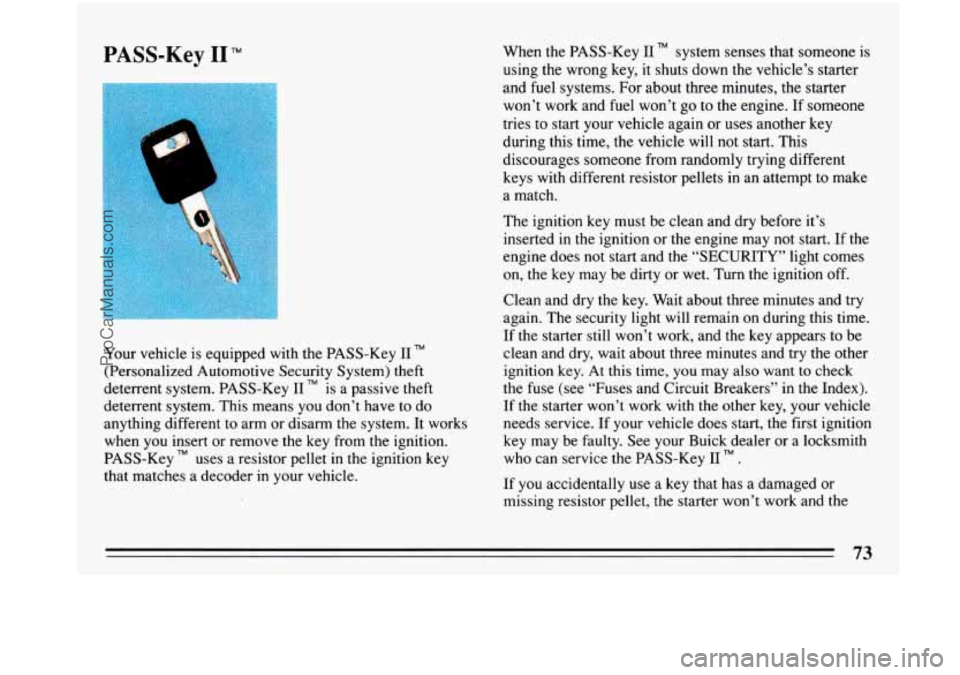
PASS-Key I1 TM
Your vehicle is equipped with the PASS-Key I1 TM
(Personalized Automotive Security System) theft
deterrent system. PASS-Key
I1 TM is a passive theft
deterrent system. This means you don’t have to do
anything different to arm or disarm the system. It works
when you insert or remove the key from the ignition.
PASS-Key
TM uses a resistor pellet in the ignition key
that matches a decoder in your vehicle. When the PASS-Key
I1 system senses that someone
using the wrong key, it shuts down the vehicle’s starter
and
fuel systems. For about three minutes, the starter
won’t work and fuel won’t go to the engine. If someonl
tries to start your vehicle again or uses another key
during this time, the vehicle will not start. This
discourages someone from randomly trying different
is
e
keys with different resistor pellets in an attempt to make
a match.
The ignition
key must be clean and dry before it’s
inserted in the ignition or the engine may not start. If the
engine does not start and the “SECURITY” light comes
on, the key may be dirty or wet. Turn the ignition
off.
Clean and dry the key. Wait about three minutes and try
again. The security light will remain on during this time.
If the starter still won’t work, and the key appears to be
clean and dry, wait about three minutes and try the other
ignition key.
At this time, you may also want to check
the fuse (see “Fuses and Circuit Breakers” in the Index).
If the starter won’t work with the other key, your vehicle
needs service. If your vehicle does start, the first ignition
key may
be faulty. See your Buick dealer or a locksmith
who can service the PASS-Key I1
TM .
If you accidentally use a key that has a damaged or
missing resistor pellet, the starter won’t work and the
ProCarManuals.com
Page 76 of 340
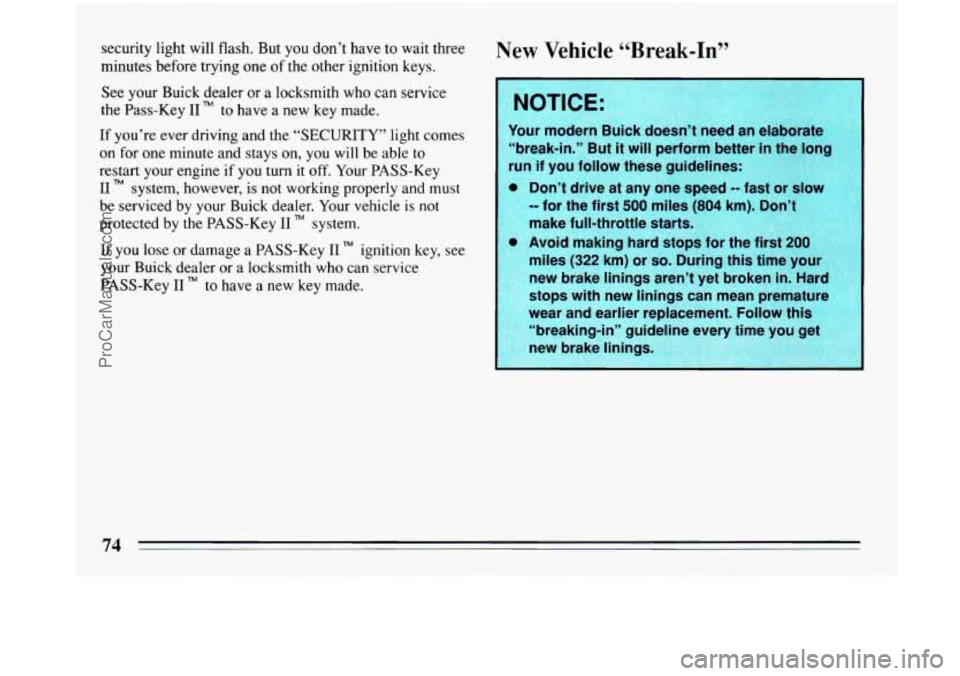
security light will flash. But you don’t have to wait three
minutes before trying one of the other ignition keys.
See your Buick dealer or a locksmith who can service
the Pass-Key I1
TM to have a new key made.
If you’re ever driving and the “SECURITY” light comes
on for one minute and stays on, you will be able to
restart your engine if
you turn it off. Your PASS-Key
I1
TM system, however, is not working properly and must
be serviced by your Buick dealer. Your vehicle
is not
protected by the PASS-Key I1
TM system.
If you
lose or damage a PASS-Key I1 ignition key, see
your Buick dealer or a locksmith who can service
PASS-Key
I1 TM to have a new key made.
New Vehicle “Break-In”
74
ProCarManuals.com